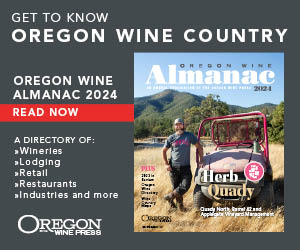Oregon Wine: Now More than Ever
By Ted Farthing
Shortly after I moved here from Manhattan, I pulled off the road into a parking lot, desperately lost. A burly man approached the car and, with a sense of urgency, motioned for me to lower the window. Prepared for conflict, I coiled. Through the narrow slit I afforded him, he beamed, “Son, we don’t see New York license plates very often. Looks like you’re a long way from home. What happened? Did you take a wrong turn in Pennsylvania? Are you lost?”
Obviously, he meant no harm.
“Well yes, thank you, as a matter of fact, I am,” I declared, utterly disarmed. “Just moved here. Looking for the farmers market.” I rolled the window all the way down. He knew every back road on the map and showed me a helpful shortcut, adding, “Welcome to Oregon! Things are different here. Greener than you might be accustomed to, more oxygen in the air. And wait ’til you taste the strawberries! Before you know it, you’ll take life a little slower, downshift to a lower gear.” He then extolled the virtues of supporting local organic farmers, and suggested a favorite vegetable grower at the market. “He sells to the best chefs in town. Do you cook?”
I came for the wine; I stayed because Oregon and its people never cease to surprise and delight me, and uncommonly warm hospitality is only the beginning. The people drawn to life in Oregon are complex characters, and not always as they appear at first blush. This is true in spades for those who choose to follow their dreams in our wine industry.
Rugged and alluring, Oregon remains a challenging place to grow grapes. Countless millennia of seafloor rising, volcanic eruptions and cataclysmic glacial action blessed us with some of the best wine-growing soil on earth. The long, cool growing season—coupled with the knowledge, skill and dedication of the people—allows uncommonly nuanced wines to emerge.
But success is not defined by profit here, nor does it come easily. The lay of the land allows only small vineyards, of a scale where you can see the end of every row. Most all businesses are family owned, literally mom-and-pop operations, where the children reared among the fledgling vines grow up to inherit their parents’ passion. These families understand that the soil is more than just a medium through which they make a living. They see their role as stewards of the land and only temporary guardians of a place to be nurtured and eventually passed into the hands of their children.
The fruit of this land is treated with equal care and respect. Grape clusters are hand-tended, hand-sorted and treated as though every single one has its own unique personality. The best grapes proceed along the sorting table to the winemaking team, while the less-than-perfect bunches head directly to the compost pile to eventually nourish next year’s crop.
Many of these artisans hail from faraway places, choosing Oregon with the understanding that they can create the most alluring wines. It is a place where long sunny days and especially cool nights allow the fruit to ripen at a gentler pace—the grapes often inching across the finish line with full flavor development right before the autumn rains. The skilled winemakers carefully watch the wines develop, much as parents nurture their children, providing them with the best environment for reaching their full potential and intervening only when necessary.
Collaboration is in our DNA, and winegrowers gather frequently throughout the year discussing Oregon’s unique challenges and sharing ideas. The intellectual wattage can be blinding, and their curiosity continuously drives innovative new wines. It is these people, who have accepted and embraced the land’s many challenges, who understand its true potential. They are both passionate, relentless iconoclasts and down-to-earth, family-focused mensches.
Just like that kind fellow in the parking lot, much more lies under the surface of our wines than initially meets the eye. With this rich sense of place and personality, every bottle provides an opportunity for layer upon layer of discovery.
Until recently, ostentatious consumption ran rampant as many wine drinkers endeavored to impress. Most have since shifted toward more genuine, authentic products and experiences distinctly selected to satisfy the soul. This is where Oregon wine has over-delivered all along.
That’s value at any price, especially now.
Ted Farthing is the executive director of the Oregon Wine Board and the Oregon Winegrowers Association. You can follow him on Twitter at @exiledsailor.








